- Home
- Fergus Hume
The Mystery of a Hansom Cab Page 7
The Mystery of a Hansom Cab Read online
Page 7
He found Brian leaning over the parapet at the end of the pier and looking at the glittering waters beneath, which kept rising and falling in a dreamy rhythm, that soothed and charmed the ear. ‘Poor girl! poor girl!’ the detective heard him mutter as he came up. ‘If she only knew all! If she—’
At this moment he heard the approaching step, and turned round sharply. The detective saw that his face was ghastly pale in the moonlight, and his brows wrinkled angrily.
‘What the devil do you want?’ he burst out, as Gorby paused. ‘What do you mean by following me all over the place?’
‘Saw me watching the house,’ said Gorby to himself. ‘I’m not following you, sir,’ he said aloud. ‘I suppose the pier ain’t private property. I only came down here for a breath of fresh air.’
Fitzgerald did not answer, but turned sharply on his heel, and walked quickly up the pier, leaving Gorby staring after him.
‘He’s getting frightened,’ soliloquised the detective to himself, as he strolled easily along, keeping the black figure in front well in view. ‘I’ll have to keep a sharp eye on him or he’ll be clearing out of Victoria.’
Brian walked quickly up to the St Kilda station, for on looking at his watch he found that he would just have time to catch the last train. He arrived a few minutes before it started, so, getting into the smoking carriage at the near end of the platform, he lit a cigarette, and, leaning back in his seat, watched latecomers hurrying into the station. Just as the last bell rang he saw a man rush along, who seemed likely to miss the train. It was the same man who had been watching him the whole evening, and Brian felt confident that he was following him. He comforted himself, however, with the thought that his pertinacious follower would lose the train, and, being in the last carriage himself, he kept a lookout along the platform, expecting to see his friend of the Esplanade standing disappointed on it. There was no appearance of him, however, so Brian, sinking back into his seat, cursed his ill-luck in not having shaken off the man who kept him under such strict surveillance.
‘Damn him!’ he muttered softly. ‘I expect he will follow me to East Melbourne, and find out where I live, but he shan’t if I can help it.’
There was no one in the carriage except himself, at which he felt a sense of relief, for he was in that humour which comes on men sometimes of talking aloud to himself.
‘Murdered in a cab,’ he said, lighting a fresh cigarette, and blowing a cloud of smoke. ‘A romance in real life, which beats Miss Braddon hollow. There is one thing certain, he won’t come between Madge and me again. Poor Madge!’ with an impatient sigh. ‘If she only knew all, there would not be much chance of our marriage; but she can never find out, and I don’t suppose anyone else ever will.’
Here a sudden thought struck him, and, rising out of his seat, he walked to the other end of the carriage and threw himself on the cushions, as if desirous to escape from himself.
‘What grounds can that man have for suspecting me?’ he said aloud. ‘No one knows I was with Whyte on that night, and the police can’t possibly bring forward any evidence to show that I was. Pshaw!’ he went on, impatiently buttoning up his coat, ‘I am like a child, afraid of my shadow—the fellow on the pier is only someone out for a breath of fresh air, as he said himself—I am quite safe.’
All the same, he did not feel easy in his mind, and when the train arrived at the Melbourne station, he stepped out on to the platform with a shiver and a quick look round, as if he expected to feel the detective’s hand on his shoulder. He saw no one, however, at all like the man he had met on the St Kilda Pier, and, with a sigh of relief, left the station. Mr Gorby, however, was on the watch, and followed him at a safe distance along the platform. Brian left the station and walked slowly along Flinders Street, apparently in deep thought; when he got to Russell Street, he turned up there, and did not stop until he came close to the Burke and Wills monument, in the very place where the cab had stopped on the night of Whyte’s murder.
‘Ah!’ said the detective to himself, as he stood in the shadow on the opposite side of the street. ‘You’re going to have a look at it are you?—I wouldn’t, if I were you—it’s dangerous.’
Fitzgerald stood for a few minutes at the corner, and then walked up Collins Street. When he got to the cab stand, opposite the Melbourne Club, still suspecting he was followed, he hailed a hansom, and drove away in the direction of Spring Street. Gorby was rather perplexed at this sudden move, but, without delay, he hailed another cab, and told the driver to follow the first till it stopped.
‘Two can play at that game,’ he said, settling himself back in the cab, ‘and I’ll get the better of you, clever as you are—and you are clever,’ he went on in a tone of admiration, as he looked round the luxurious hansom, ‘to choose such a convenient place for a murder; no disturbance and plenty of time for escape after you had finished; it’s a pleasure going after a chap like you, instead of men who tumble down like ripe fruit, and ain’t got any brains to keep their crime quiet.’
While the detective thus soliloquised, his cab, following on the trail of the other, had turned down Spring Street, and was being driven rapidly along the Wellington Parade, in the direction of East Melbourne. It then turned up Powlett Street, at which Mr Gorby exulted.
‘Ain’t so clever as I thought,’ he said to himself. ‘Shows his nest right off, without any attempt to hide it.’
The detective, however, had reckoned without his host, for the cab in front kept driving on, through an interminable maze of streets, until it seemed as if Brian was determined never to stop the whole night.
‘Look ’ere, sir!’ cried Gorby’s cabman, looking through his trapdoor in the roof of the hansom, ‘’ow long’s this ’ere game a-goin’ to larst; my ’oss is knocked up ’e is, and ’is blessed old legs is a-givin’ way under ’im!’
‘Go on! go on!’ answered the detective impatiently, ‘I’ll pay you well.’
The cabman’s spirits were raised by this, and by dint of coaxing and a liberal use of the silk he managed to get his jaded horse up to a pretty good pace. They were in Fitzroy by this time, and then both cabs turned out of Gertrude Street into Nicholson Street; thence passed on to Evelyn Street and along Spring Street, until Brian’s cab stopped at the corner of Collins Street, and Gorby saw him alight and dismiss his cabman. He then walked down the street and disappeared into the Treasury Gardens.
‘Confound it,’ said the detective as he got out and paid his fare, which was not by any means a light one, but over which he had no time to argue, ‘we’ve come in a circle, and I do believe he lives in Powlett Street after all.’
He went into the gardens, and saw Brian some distance ahead of him, walking rapidly. It was bright moonlight, and he could easily distinguish Fitzgerald by his light coat. He went along that noble avenue of elms, which were in their winter dress, and the moon shining through their branches wrought fantastic tracery on the smooth asphalt beneath. And on either side Gorby could see the dim white forms of the old Greek gods and goddesses—Venus Victrix with the apple in her hand—which Mr Gorby, in his happy ignorance of heathen mythology, took for Eve offering Adam the forbidden fruit; Diana, with the hound at her feet; and Bacchus and Ariadne, which the detective imagined were the Babes in the Wood. He knew that each of the statues had queer names, but thought they were merely allegorical. Passing over the bridge with the water rippling quietly underneath, Brian went up the smooth yellow path to where the statue of Hebe holding the cup seems instinct with life and almost stepping off the pedestal, and turning down the path to the right he left the gardens by the end gate, near which stands the statue of the Dancing Faun, with the great bush of scarlet geranium burning like an altar before it. Then he went along the Wellington Parade and turned up Powlett Street, where he stopped at a house near Cairns Memorial Church, much to Mr Gorby’s relief, who, being like Hamlet, ‘fat and scant of breath,’ found himself rather exhausted. He kept well in the shadow, however, and saw Fitzgerald give one final look rou
nd before he disappeared into the house. Then Mr Gorby, like the Robber Captain in Ali Baba, took careful stock of the house, and fixed its locality and appearance well in his mind, as he intended to call at it on the morrow.
‘What I’m going to do,’ he said, as he walked slowly back to Melbourne, ‘is to see his landlady when he’s out, and find out what time he came in on the night of the murder. If it fits into the time he got out of Rankin’s cab I’ll get out a warrant, and arrest him straight off.’
CHAPTER NINE
MR GORBY IS SATISFIED AT LAST
In spite of his long walk and still longer drive Brian did not sleep well that night. He kept tossing and turning or else lying on his back, wide awake, looking into the darkness, and thinking of Whyte. Towards dawn, when the first faint glimmer of morning came through the venetian blinds, he fell into a sort of uneasy doze, haunted by horrible dreams. He thought he was driving in a hansom, when suddenly he found Whyte by his side, clad in white cerements, grinning and gibbering at him with ghastly merriment. Then the cab went over a precipice, and he fell from a great height down, down, with the mocking laughter still sounding in his ears, until he woke with a loud cry and found it was broad daylight, and that drops of perspiration were standing on his brow. It was no good trying to sleep any longer, so with a weary sigh he arose and went for his tub, feeling jaded and worn out, by worry and want of sleep. His bath did him some good, as the cold water brightened him up and pulled him together. Still he could not help giving a start of surprise when he saw his face looking at him from the mirror, old and haggard-looking, with dark circles round the eyes.
‘A pleasant life I’m going to have of it if this sort of thing goes on,’ he said bitterly, ‘I wish to God I had never seen or heard of Whyte.’
He dressed himself carefully, however, for Brian was a man who never neglected his toilet, however worried and out of sorts he might feel. Yet, notwithstanding his efforts to throw off his gloom and feel cheerful, his landlady was startled when she saw how haggard and worn his handsome face looked in the searching morning light.
She was a small, dried-up little woman, with a wrinkled yellow face, and looked so parched and brittle that strangers could not help thinking it would do her good if she were soaked in water for a year, in order to soften her a little. Whenever she moved she crackled, and one was in constant dread of seeing one of her wizen-looking limbs break off short, like the branch of a dead tree. When she spoke it was in a hard shrill voice, like a cricket, and being dressed in a faded brown silk, what with her voice and attenuated body she was not unlike that noisy insect. She crackled into Brian’s sitting-room with the Argus and coffee, and a look of dismay came over her stony little face as she saw his altered looks.
‘Dear me, sir,’ she chirped out in her shrill voice, as she placed her burden on the table, ‘are you took bad?’
Brian shook his head.
‘Want of sleep, that’s all, Mrs Sampson,’ he answered, unfolding the Argus.
‘Ah! that’s because ye ain’t got enough blood in yer ’ead,’ said Mrs Sampson wisely, for she had her own ideas on the subject of health. ‘If you ain’t got blood you ain’t got sleep.’
Brian looked at her as she said this, for there seemed such an obvious want of blood in her veins, that he wondered if she had ever slept in all her life.
‘There was my father’s brother, which, of course, makes ’im my uncle,’ went on the landlady, pouring out a cup of coffee for Brian, ‘an’ the blood ’e ’ad was somethin’ astoundin’, which it made ’im sleep that long as they ’ad to draw pints from ’im afore ’e’d wake in the mornin’.’
Brian had the Argus before his face, and under its friendly cover, laughed quietly to himself at the very tall story Mrs Sampson was telling.
‘His blood poured out like a river,’ went on the landlady, still drawing from the rich stores of her imagination, ‘and the doctor was struck dumb with astonishment at see in’ the Nigagerer which bust from ’im—but I’m not so full-blooded myself.’
Fitzgerald again stifled a laugh, and wondered that Mrs Sampson was not afraid of being treated in the same manner as Ananias and Sapphira. However, he said nothing, but merely intimated that if she would leave the room, he would take his breakfast.
‘An’ if you wants anythin’ else Mr Fitzgerald,’ she said going to the door, ‘you knows your way to the bell as easily as I do the kitching,’ and with a final chirrup, she crackled out of the room.
As soon as the door was closed, Brian put down his paper and roared, in spite of the worry he was in. He had that extraordinary vivacious Irish temperament, by which a man can put all trouble behind his back, and thoroughly enjoy the present. His landlady with her Arabian Night-like romances was a source of great amusement to him, and he felt considerably cheered by the odd turn her humour had taken this morning. After a time, however, his laughter ceased, and all his troubles came crowding on him again. He drank his coffee, but pushed away the food which was before him, and then looked through the Argus, to see the latest report about the murder case. What he read made his cheek turn even paler than it was, and he could feel his heart beating loudly.
‘They’ve found a clue, have they?’ he muttered, rising and pacing restlessly up and down. ‘I wonder what it can be? I threw that man off the scent last night, but if he suspects me, there will be no difficulty in him finding out where I live. Bah! What nonsense I am talking, I am the victim of my own morbid imagination. There is nothing to connect me with the crime, so I need not be afraid of my shadow. I’ve a good mind to leave town for a time, but if I am suspected, that would excite suspicion. Oh, Madge! my darling,’ he cried passionately, ‘if you only knew what I suffer, I know that you would pity me—but you must never know the truth. Never! Never!’ and sinking into a chair by the window, he covered his face with his hands. After remaining in this position for some minutes, occupied with his own gloomy thoughts, he arose and rang the bell. A faint crackle in the distance announced that Mrs Sampson had heard it, and she soon came into the room looking more like a cricket than ever. Brian had gone into his bedroom, and called out to her from there—
‘I am going down to St Kilda, Mrs Sampson,’ he said, ‘and probably will not be back all day.’
‘Which I ’opes it ’ull do you good,’ answered the cricket, ‘for you’ve eaten nothin’, an’ the sea breezes is miriculous for makin’ you take to your victuals. My mother’s brother bein’ a sailor, an’ wonderful for ’is stomach, which, when ’e ’ad done a meal, the table looked as if a low-cuss ’as gone over it.’
‘A what?’ asked Fitzgerald, buttoning his gloves.
‘A low-cuss,’ replied the landlady in surprise at his ignorance, ‘as I’ve read in ’Oly Writ, as ’ow John the Baptist was partial to ’em, not that I think they’d be very fillin’, tho’ to be sure ’e ’ad a sweet tooth, and ate ’oney with ’em.’
‘Oh! you mean locusts,’ said Brian, now enlightened.
‘An’ what else?’ asked Mrs Sampson indignantly, ‘which tho’ not bein’ a scholar’d, I speaks English I ’opes, my mother’s second cousin ’avin’ ’ad first prize at a spellin’ bee, tho’ ’e died early thro’ brain fever, ’avin’ crowded ’is ’ead over much with the dictionary.’
‘Dear me!’ answered Brian mechanically. ‘How unfortunate.’ He was not listening to Mrs Sampson’s remarks, but was thinking of an arrangement which Madge had made, and which he had forgotten till now.
‘Mrs Sampson,’ he said, turning round at the door, ‘I am going to bring Mr Frettlby and his daughter to have a cup of afternoon tea here, so you might have some ready.’
‘You ’ave only to ask and to ’aye,’ answered Mrs Sampson hospitably, with a gratified crackle of all her joints. ‘I’ll make the tea, sir, an’ also some of my own perticler cakes, bein’ a special kind I ’ave, which my mother showed me ’ow to make ’avin’ been taught by a lady as she nussed thro’ the scarlet fever, tho’ bein’ of a weak constitootion, she died s
oon arter, bein’ in the ’abit of contractin’ any disease she might chance on.’
As Brian did not care about a connection between cooking and scarlet fever, he hurried away lest Mrs Sampson should bring out more charnel-house horrors, for which she had a Poe-like appreciation. Indeed, at one period of her life, the little woman having been a nurse, she had frightened one of her patients into convulsions during the night, by narrating to her, the history of all the corpses she had laid out. This ghoul-like tendency having been discovered, she never obtained any more patients to nurse, as they objected when in a weak state, to hear such grotesque horrors.
As soon as Fitzgerald had gone, she went over to the window and watched him as he walked slowly down the street—a tall handsome man, of whom any woman would be proud.
‘What an awful thing it are, to think ’e’ll be a corpse some day,’ she chirped cheerily to herself, ‘tho’ of course bein’ a great swell in ’is own place, ’e’ll ’ave a nice airy vault, which ’ud be far more comfortable than a close stuffy grave, even tho’ it ’as a tombstone an’ vi’lets over it. Ah, now! Who are you impertinerce?’ she broke off, as a stout man in a light suit of clothes crossed the road and rang the bell, ‘a-pullin’ at the bell as if it were a pump ’andle.’
As the gentleman at the door who was none other than Mr Gorby, did not hear her, he of course did not reply, so she hurried down the stairs, crackling with anger at the rough usage her bell had received.
Mr Gorby had seen Brian go out, and deeming it a good opportunity to prosecute enquiries, had lost no time in making a start.
‘You nearly tored the bell down,’ said the fiery cricket, as she presented her thin body and wrinkled face to the view of the detective.
‘I’m very sorry,’ answered Gorby, meekly, ‘I’ll knock next time.’

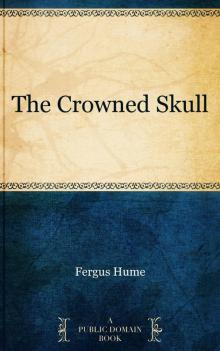 The Crowned Skull
The Crowned Skull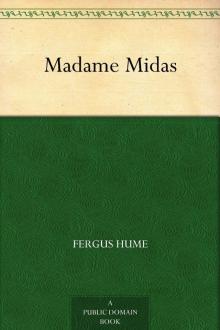 Madame Midas
Madame Midas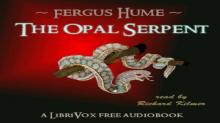 The Opal Serpent
The Opal Serpent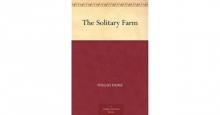 The Solitary Farm
The Solitary Farm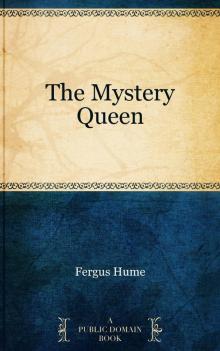 The Mystery Queen
The Mystery Queen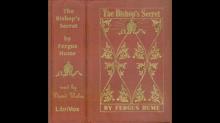 The Bishop's Secret
The Bishop's Secret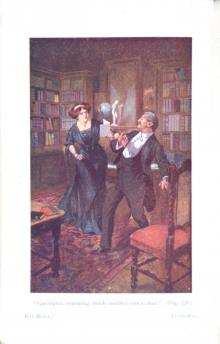 Red Money
Red Money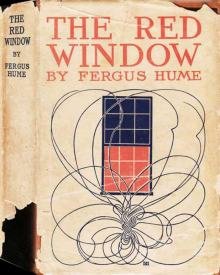 The Red Window
The Red Window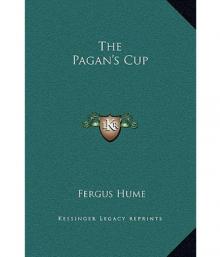 The Pagan's Cup
The Pagan's Cup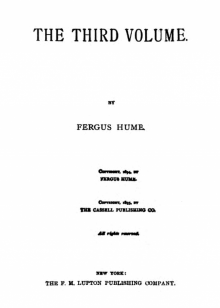 The Third Volume
The Third Volume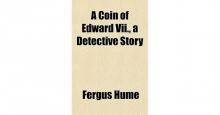 A Coin of Edward VII: A Detective Story
A Coin of Edward VII: A Detective Story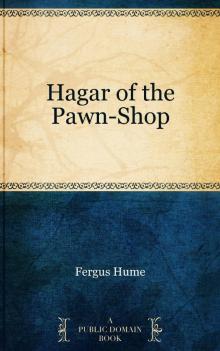 Hagar of the Pawn-Shop
Hagar of the Pawn-Shop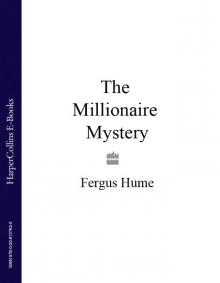 The Millionaire Mystery
The Millionaire Mystery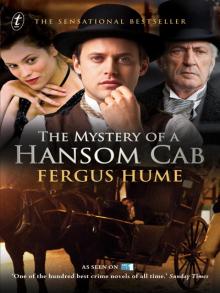 The Mystery of a Hansom Cab
The Mystery of a Hansom Cab